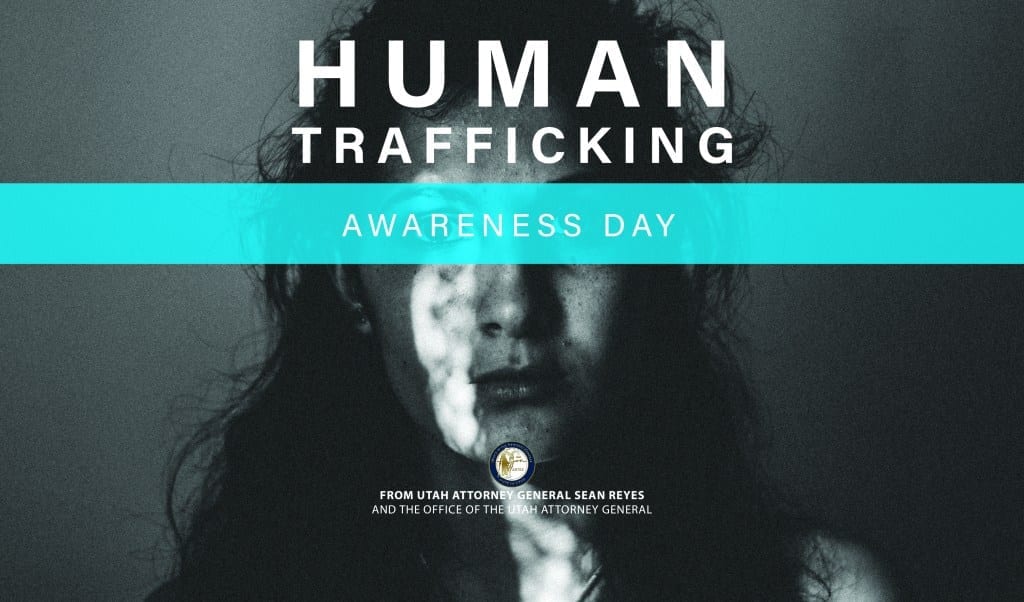
Human Trafficking Awareness Day is January 11
By: The Utah Office of the Attorney General
January is National Slavery and Human Trafficking Prevention Month, and January 11th is Human Trafficking Awareness Day. The Utah Attorney General’s Office, in partnership with the Trafficking in Persons Program, Refugee & Immigrant Center – Asian Association of Utah, and the Utah Trafficking in Persons (UTIP) Task Force, will present a series of commentaries to educate and engage the public on the realities and complex dynamics of human trafficking.
Recognizing and Reporting
Human trafficking, by its criminal nature, is secretive. Traffickers use “invisible ropes” involving complex manipulative tactics to control their victims. If human trafficking in Utah doesn’t typically involve the use of handcuffs, chains, cages, locked rooms, or shipping containers that books and movies might use to portray the subject, how can we recognize it?
First, before addressing the red flags which may indicate human trafficking and what someone observing red flags can do, remember Rule #1: Keep yourself safe. Do not place yourself in danger. Never confront a suspected trafficker.
If you can safely observe a suspicious situation, recognize the red flags, and report them to the proper authorities, you can make a difference. Most of the successful human trafficking cases prosecuted through the Attorney General’s office have started with a tip from a concerned citizen.
There are a number of red flags that, in and of themselves, may not be too sinister. But as the red flags pile up, they may begin to indicate a trafficking situation. Pay particular attention to any situation where:
- A person is recruited for work with grand and unlikely promises;
- A person works excessive hours for little or no pay;
- A person exhibits signs of untreated illness or injuries;
- A person is not in control of his or her identification, immigration, or travel documents;
- A person exchanges sex to meet basic needs, e.g., food, clothing, or shelter;
- A person’s behavior appears to be controlled or fearful;
- A younger person travels with an older boyfriend or companion who seems particularly watchful or controlling;
- A person suddenly acquires expensive and/or revealing clothing, jewelry, or electronics, without explanation for how they obtained the products;
- A person’s communication is restricted and she or he is unable to speak separately or alone;
- A person owes money to her or his employer;
- A person says they “can’t quit” their job because of fear of some great harm, such as deportation;
- A person demonstrates sudden changes in behavior.
These red flags are not uncommon. Any given day we could encounter someone we suspect might be a victim of human trafficking—either for labor or sexual exploitation—while we are at a park, at the mall, on a bus or train, or even at school. If it can be done safely, consider asking some questions that will elicit helpful information without appearing to be inquiring about human trafficking. Ask about where they are from, where they live now, or with whom they live. If they are traveling with a suspicious companion, ask how they met. If they have tattoos—which can be used to brand or identify a trafficker’s victims—ask about them, what do they mean, when did they get them, what’s the story behind them.
If the conversation proceeds to uncover additional red flags, and circumstances permit—remember not to place yourself in danger or ask too specific of questions while a suspected trafficker is within hearing range—move to deeper, more targeted questions. Ask if they have ever been forced to do work that they did not want to do, or if they have ever worked in a place where the work was different from what they were promised it would be. Ask if anyone takes all or part of the money they earn. Has anyone threatened them or their family? Are they in possession of their identification and travel documents, or does someone else have control over those documents? Has anyone ever taken photos of them and put them on the internet? Have they ever exchanged sex for food, shelter, drugs, or money? Ask if they feel trapped in their situation.
Traffickers rely on the general public not asking questions, not recognizing the red flags, and simply looking the other way. Simple conversation with someone we might suspect is a victim of human trafficking can provide valuable insights into the situation. Details and red flags identified from a conversation can then be passed on to law enforcement officers who can further investigate and determine whether human trafficking is taking place.
URL: https://attorneygeneral.utah.gov/human-trafficking-awareness-day-2019/
